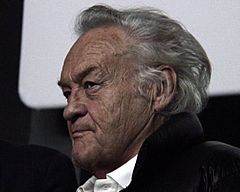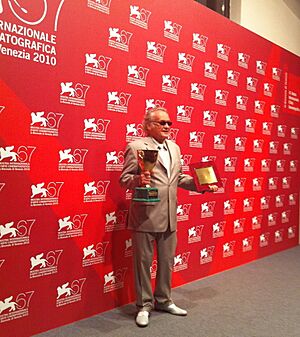Jerzy Skolimowski facts for kids
Quick facts for kids
Jerzy Skolimowski
|
|
|---|---|

Skolimowski at the 10th Lisbon & Estoril Film Festival in 2016
|
|
| Born | 5 May 1938 Łódź, Poland
|
| Alma mater | Łódź Film School |
| Occupation | Filmmaker, director, screenwriter, actor, painter |
| Years active | 1960–present |
| Spouse(s) |
Joanna Szczerbic
(m. 1966; div. 2014)
|
| Children | 2 |
Jerzy Skolimowski (born May 5, 1938) is a famous Polish film director, writer, actor, and painter. He is known for making more than twenty movies. He has won many important awards for his work.
Skolimowski started his career by writing the script for the movie Innocent Sorcerers (1960). One of his first big awards was the Golden Bear prize in 1967 for his film The Departure. Some of his other well-known films include Deep End (1970), The Shout (1978), and Moonlighting (1982).
He lived in Los Angeles for over 20 years, where he focused on painting and sometimes acted in movies. After a 17-year break from directing, he returned to Poland to make the film Four Nights with Anna (2008).
In 2016, he received the Golden Lion Award for Lifetime Achievement at the Venice Film Festival. His 2022 film EO won the Jury Prize at the Cannes Film Festival and was nominated for an Academy Award.
Contents
Early Life and Education
Jerzy Skolimowski was born in Łódź, Poland. His childhood was shaped by the events of World War II. As a young boy, he was rescued from a bombed building in Warsaw. His father was part of the Polish Resistance and was killed by the Nazis. His mother bravely hid a Jewish family in their home.
After the war, his mother worked for the Polish embassy in Prague. In school, Skolimowski was friends with future filmmakers Miloš Forman and Ivan Passer. He was known for being a bit of a troublemaker.
In college, he studied history and literature. He also became interested in boxing and jazz music. His interest in jazz connected him with famous artists like the composer Krzysztof Komeda and the director Roman Polanski.
Starting a Career in Film
Writing and First Films
Before becoming a director, Skolimowski was a writer. He published books of poems and short stories. He met the famous Polish director Andrzej Wajda, who asked for his opinion on a script. Skolimowski thought he could do better and wrote his own version. This became the movie Innocent Sorcerers, in which Skolimowski also acted as a boxer.
He then went to the famous Łódź Film School. He wanted to become a director quickly. He cleverly used the film given to him for school projects to shoot scenes for his own movie. By the time he finished his course, he had already made a full-length film.
Working with Roman Polański
Skolimowski worked with Polański, writing the dialogue for the movie Knife in the Water (1962). This film became very successful.
Between 1964 and 1967, he directed several films in Poland. These included Rysopis, Walkover, and Barrier. His film Le Départ, which he made in Belgium, won the Golden Bear award at the 17th Berlin International Film Festival.
International Success
Moving to London
Skolimowski made a film in Poland called Ręce do góry (Hands Up!). The movie had themes that criticized the government at the time. Because of this, the film was banned, and he had to leave Poland. He moved to London.
His next film was Deep End (1970). It was a story about a teenager working at a public swimming pool in London. The movie was a success and showed his unique style of filmmaking.
Major Films of the 1970s and 1980s
Throughout the 1970s and 1980s, Skolimowski directed several important films. The Shout (1978) won a major prize at the Cannes Film Festival.
His 1982 film Moonlighting, starring Jeremy Irons, was one of his most successful movies. It tells the story of Polish workers in London who are cut off from their home country.
Working in the United States
Skolimowski later moved to the United States. His first American film was The Lightship (1985), starring Robert Duvall. The movie is a tense story set on a ship and won an award at the Venice Film Festival.
He also worked as an actor. He played a KGB colonel in the movie White Nights (1985). In 2012, he appeared in the superhero movie The Avengers as a character who questions the Black Widow.
Return to Directing
After a long break, Skolimowski returned to directing in 2008 with Four Nights with Anna. In 2010, he directed Essential Killing, a thriller starring Vincent Gallo. The film won many awards, including the Special Jury Prize at the Venice Film Festival.
His 2015 film 11 Minutes was chosen as Poland's entry for the Academy Awards.
In 2022, he released EO, a film told from the point of view of a donkey. The movie was a huge success. It won the Jury Prize at the Cannes Film Festival and was nominated for an Academy Award for Best International Feature Film.
Filmography
| Year | Original Title | English Title | Director | Writer | Producer | Actor | Notes |
|---|---|---|---|---|---|---|---|
| 1960 | Niewinni czarodzieje | Innocent Sorcerers | No | Yes | No | Yes | |
| 1962 | Nóż w wodzie | Knife in the Water | No | Yes | No | No | |
| 1965 | Rysopis | Identification Marks: None | Yes | Yes | No | Yes | Also editor and art director |
| 1965 | Walkower | Walkover | Yes | Yes | No | Yes | Also editor |
| 1966 | Bariera | Barrier | Yes | Yes | No | No | |
| 1967 | Le départ | The Departure | Yes | Yes | No | No | |
| 1970 | The Adventures of Gerard | Yes | Yes | No | No | ||
| 1970 | Deep End | Yes | Yes | No | Yes | ||
| 1972 | King, Queen, Knave | Yes | Yes | No | Yes | ||
| 1978 | The Shout | Yes | Yes | No | No | ||
| 1981 | Ręce do góry | Hands Up! | Yes | Yes | No | Yes | Filmed in 1967 |
| 1982 | Moonlighting | Yes | Yes | Yes | Yes | ||
| 1984 | Success Is the Best Revenge | Yes | Yes | Yes | No | ||
| 1985 | The Lightship | Yes | No | No | No | ||
| 1985 | White Nights | No | No | No | Yes | ||
| 1989 | Torrents of Spring | Yes | Yes | No | Yes | ||
| 1991 | Ferdydurke | 30 Door Key | Yes | Yes | Yes | Yes | |
| 1996 | Mars Attacks! | No | No | No | Yes | ||
| 2007 | Eastern Promises | No | No | No | Yes | ||
| 2008 | Cztery noce z Anna | Four Nights with Anna | Yes | Yes | Yes | No | |
| 2010 | Essential Killing | Yes | Yes | Yes | No | ||
| 2012 | The Avengers | No | No | No | Yes | ||
| 2015 | 11 Minut | 11 Minutes | Yes | Yes | Yes | No | |
| 2022 | IO | EO | Yes | Yes | Yes | No | |
| 2023 | The Palace | No | Yes | No | No | ||
Major Awards
| Year | Award | Category |
|---|---|---|
| 1967 | Berlin Film Festival | Golden Bear (Le départ) |
| 1978 | Cannes Film Festival | Special Jury Prize (The Shout) |
| 1982 | Cannes Film Festival | Best Screenplay (Moonlighting) |
| 1985 | Venice Film Festival | Special Jury Prize (The Lightship) |
| 2008 | Tokyo Film Festival | Special Jury Prize (Four Nights with Anna) |
| 2010 | Venice Film Festival | Special Jury Prize (Essential Killing) |
| 2010 | Polish Film Awards | Eagle: Best Director (Essential Killing) |
| 2010 | Polish Film Awards | Eagle: Best Film (Essential Killing) |
| 2016 | Venice Film Festival | Golden Lion for Lifetime Achievement |
| 2022 | Cannes Film Festival | Jury Prize (EO) |
| 2023 | Polish Film Awards | Eagle: Best Film (EO) |
| 2023 | Polish Film Awards | Eagle: Best Director (EO) |
See also
 In Spanish: Jerzy Skolimowski para niños
In Spanish: Jerzy Skolimowski para niños
- Polish cinema
- List of Poles
 | Delilah Pierce |
 | Gordon Parks |
 | Augusta Savage |
 | Charles Ethan Porter |


